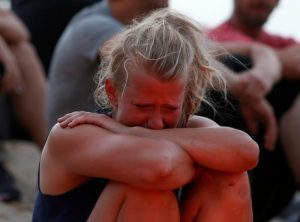
LESBOS, Greece (Reuters) – Greece asked its European partners on Monday for help implementing a deal with Turkey meant to stem an influx of migrants into Europe, as hundreds more – many unaware of the new rules – streamed from their boats onto Greek islands.
For months the epicenter of Europe’s biggest migrant crisis since World War Two, Greece is struggling to effect the logistics operation needed to process asylum applications from hundreds of migrants still arriving daily along its shoreline.
Turkish officials arrived on the island of Lesbos on Monday to help put the deal into practice. Anyone who arrived after March 20 must be held until their papers are processed and those deemed ineligible are to be sent back to Turkey from April 4.
Late on Monday, a first group of 150 migrants from Pakistan and Bangladesh were transferred – handcuffed and under police escort – from the island’s registration center to a passenger ferry that would take them to the mainland by early morning.
They had arrived on Lesbos on Sunday and would be taken to immigration offices in Athens, a police spokesman said.
Under the EU-Turkey roadmap agreed last Friday, a plan must be made by March 25 and some 4,000 personnel – more than half from other European Union member states – deployed to the islands by next week.
“We must move very swiftly and in a coordinated manner over the next few days to get the best possible result,” Greek Prime Minister Alexis Tsipras said after meeting EU Migration Commissioner Dimitris Avramopoulos in Athens.
“Assistance in human resources must come quickly.”
Avramopoulos said France, Germany and the Netherlands had already pledged logistics and personnel.
“We are at a crucial turning point … The management of the refugee crisis for Europe as a whole hinges on the progress and success of this agreement,” he said.
However, on Monday, the day after the formal start of an agreement intended to close off the main route through which a million refugees and migrants arrived in Europe last year, authorities said 1,662 people had arrived on Greek islands by 7 a.m. (0500 GMT), twice the official count of the day before.
REFUGEES UNDETERRED
Just after 4:30 a.m. on Monday, one coastguard vessel rescued 54 refugees and migrants from the open sea and brought them to the port, some of the 698 arrivals counted in Lesbos.
They staggered down the ramp, women and children first, one elderly man bundled up in blankets.
“Where are we going?” asked one Syrian woman who was traveling with her husband and daughter.
The group were directed to a coastguard bus that would drive them to the Moria “hot spot”, a center where new arrivals are being registered and their asylum applications processed.
“We are very tired. I want to go to my family in Sweden,” said Ahmet Bayraktar, a 32-year-old unemployed accountant from Aleppo, Syria. “We’ll try, God willing.”
Like others, he was unaware of the new EU-Turkey accord.
“We don’t know about this,” Bayraktar said. “We’re coming directly from Syria. Everybody wants to go to the border. We don’t have the news, we don’t have electricity, we don’t have anything.”
Two hours later, just as the sun rose above the Aegean Sea, the same coastguard vessel pulled another 44 people from the water. One woman cradled a baby just a few months old.
They walked silently to the bus for Moria, a sprawling, gated complex of prefabricated containers and tents.
“IT’S BETTER THAN SYRIA”
Before Friday’s deal, migrants and refugees had been free to wander out of the camp and head to ferries to the Greek mainland, from where they would mostly head north through the Balkans towards wealthier western Europe, especially Germany.
Now, new arrivals are supposed to be held in centers pending the outcome of their asylum applications.
Under the deal, for every Syrian returned to Turkey, another would be resettled from Turkey within the European Union, a process which has already triggered alarm from human rights groups for being discriminatory, a violation of international law and one which could be challenged in court.
Some diplomats believe the accord could unravel within months because neither side looks able to deliver on its commitments, but that the need to get the migration crisis under control is so urgent that it was felt best to clinch a deal now and deal with shortcomings later.
The fate of the nearly 47,000 migrants, stranded in Greece when countries along the Balkan route shut their borders a few weeks ago, remains unclear.
Hundreds of migrants traveling from the islands to the Greek mainland disembarked on Monday at the port of Pireaus near Athens. They appeared free to leave because they had landed in Greece before Sunday, witnesses said.
Some migrants said they would try to reach Idomeni, a northern Greek frontier outpost where some 12,000 refugees and migrants remain stranded, hoping that Macedonia will reopen the border and let them pass through.
“I will try to go to the border with Macedonia within the next 10 days even if it’s closed. Maybe I will have to come back here, maybe not, but anyway it’s better than Syria,” said Hozefa Hasdibo, 23, from Idlib in Syria.
(Additional reporting by Lefteris Karagiannopoulos and Renee Maltezou; Editing by Louise Ireland)










